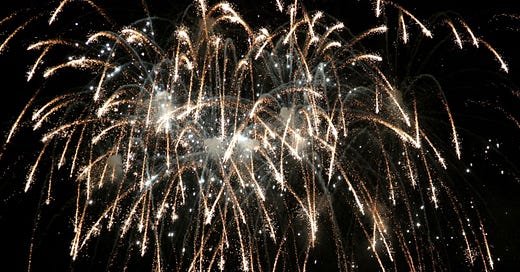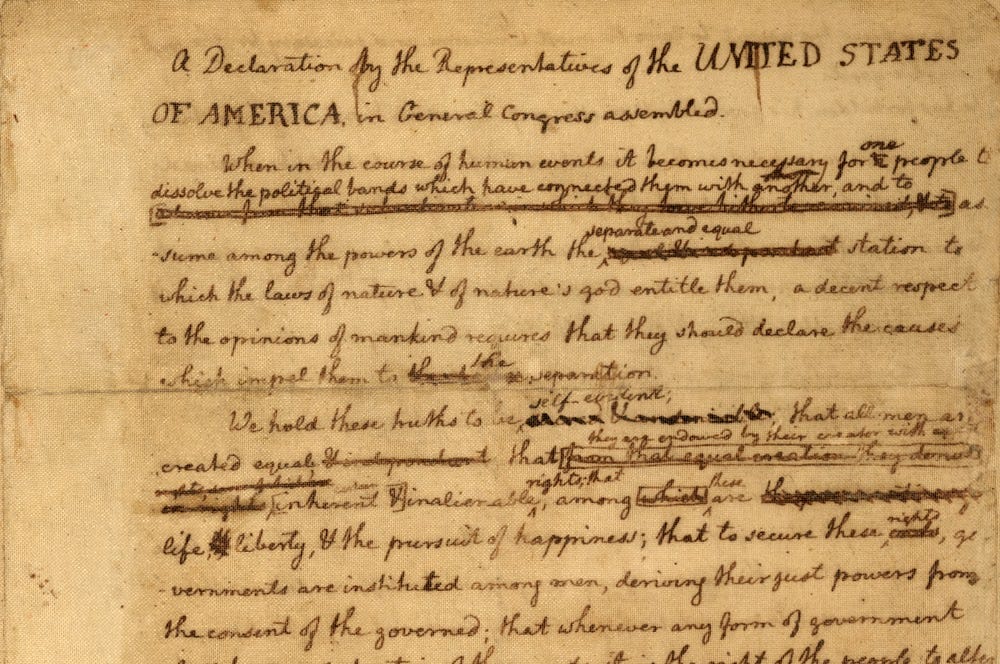Here's a way to think about the reason we have long fireworks displays on Independence Day:
As anyone who has raised a teenager, tried to break off a bad relationship, or free themselves from an addictive behavior can tell you, separation -- even healthy separation -- does not come quickly or easily.
In other words, independence is a long and explosive process.
We mark July 4, 1776 as the day we celebrate our Independence, because it's the date the Continental Congress adopted the Declaration of Independence. We need to remember, though, is that the Declaration of Independence didn't start the American Revolutionary War. As important as the Declaration of Independence was, it was only a document.
That sheet of paper, by itself, didn't bring independence to anyone.
That's why a couple of other dates are important. One is April 19, 1775. That's the day (fifteen months earlier) that the Revolutionary War started, as the first shots were fired in the Battles of Lexington and Concord. The other date is September 3, 1783. That's the date (eight years and five months after the bloodshed at Lexington and Concord) that the Treaty of Paris was signed, formally ending the Revolutionary War.
By the time the Continental Congress declared our independence from Great Britain, we'd already been in armed conflict for over a year, and the fighting would continue for a total of almost eight and a half years.
Yes, armed conflict. Yes, fighting. I'm not a war monger, and I'm no expert in world history, but it's pretty safe to say that generally speaking, masters do not cheerfully and calmly relinquish control over their subjects. There are probably instances in history of an oppressed people achieving freedom from their oppressors without any bloodshed. But right off the top of my head, I can't think of any struggle for independence that wasn't...well...a struggle. A fight.
Independence is a long and explosive process. We don't just wake up one day and say "I'm free!" Whether it's freedom from old habits/addictions/compulsions/attitudes, freedom from financial debt, freedom from "spiritual forces of wickedness," "evil powers that corrupt and destroy," "sinful desires that draw us from the love of God," or freedom from prejudice or a -ism, independence takes time. Whoever or whatever has a hold on us is not, generally speaking, going to let go easily, or quickly.
Which brings me to another point: as much as we idolize the idea of "independence," there's really no such thing.
There's really no such thing as independence: there is only independence FROM something (or another) as we become more dependent or interdependent on some other one (or thing).
Perhaps "Independence Day" should be called "Independence From Great Britain Day," because in order to achieve independence from Great Britain, early American colonists had to become more dependent on one another. Not to mention more dependent on France.
The point is, no human being is truly independent.
And that's not just a religious or spiritual claim: a quick study of the process of photosynthesis proves we are dependent on a pigment called chlorophyll for every breath we take.
And no human organization is truly independent. We are all dependent or inter-dependent, to one degree or another, on God, nature, and on one another. That's true of businesses, schools, churches, athletic teams, and nation-states. No one is truly independent.
So there you have it: as you watch fireworks this Fourth of July, give thanks for the long, explosive process our founders went through, teaching us something about independence. And then give thanks for our dependence and interdependence on them, on God, and on others for the freedoms we enjoy.






Raise your hand if you are not going through a long, explosive process of independence from some-thing or some-one